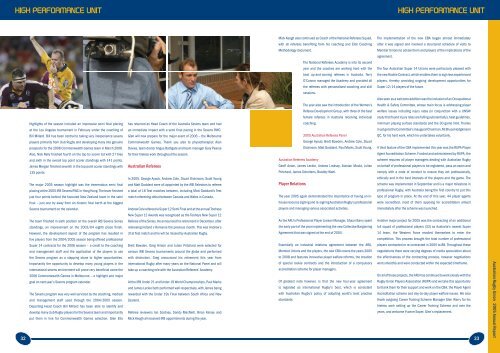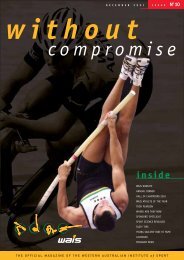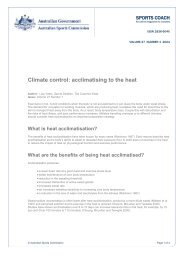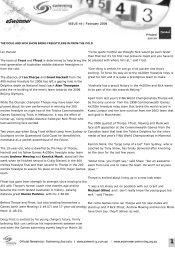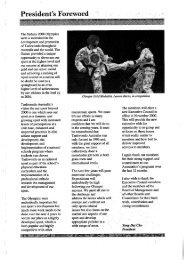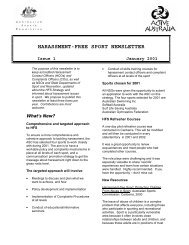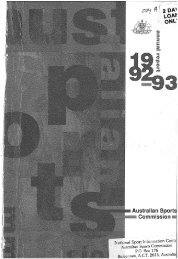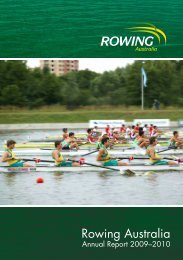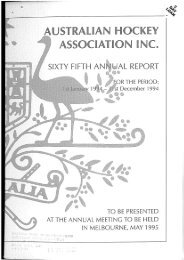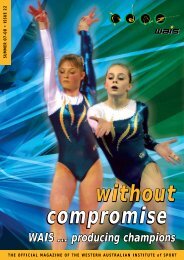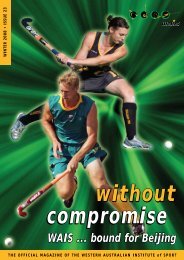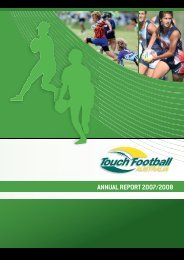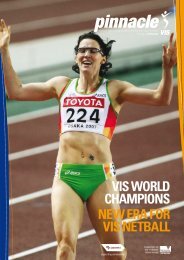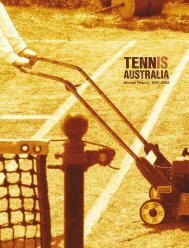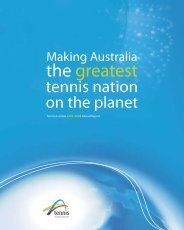community rugby - Australian Sports Commission
community rugby - Australian Sports Commission
community rugby - Australian Sports Commission
Create successful ePaper yourself
Turn your PDF publications into a flip-book with our unique Google optimized e-Paper software.
HIGH PERFORMANCE UNIT<br />
HIGH PERFORMANCE UNIT<br />
32<br />
Highlights of the season included an impressive semi final placing<br />
at the Los Angeles tournament in February under the coaching of<br />
Bill Millard. Bill has been central to taking very inexperience sevens<br />
players primarily from club Rugby and developing many into genuine<br />
prospects for the 2006 Commonwealth Games team in March 2006.<br />
Also, Nick Reily finished fourth on the top try scorer list with 27 tries<br />
and sixth in the overall top point scorer standings with 141 points.<br />
James Morgan finished seventh in the top point scorer standings with<br />
135 points.<br />
The major 2005 season highlight was the tremendous semi final<br />
placing at the 2005 iRB Sevens RWC in Hong Kong. The team finished<br />
just four points behind the favoured New Zealand team in the semi<br />
final – just one try away from an historic final berth at the biggest<br />
Sevens tournament on the calendar.<br />
The team finished in sixth position on the overall iRB Sevens Series<br />
standings, an improvement on the 2003/04 eighth place finish.<br />
However, the development aspect of the program has resulted in<br />
five players from the 2004/2005 season being offered professional<br />
Super 14 contracts for the 2006 season – a credit to the coaching<br />
and management staff and the application of the players to use<br />
the Sevens program as a stepping stone to higher opportunities.<br />
Importantly the opportunity to develop many young players in the<br />
international sevens environment will prove very beneficial come the<br />
2006 Commonwealth Games in Melbourne – a highlight and major<br />
goal on next year’s Sevens program calendar.<br />
The Sevens program was very well serviced by the coaching, medical<br />
and management staff used through the 2004/2005 season.<br />
Departing Head Coach Bill Millard has been able to identify and<br />
develop many club Rugby players for the Sevens team and importantly<br />
put them in line for Commonwealth Games selection. Glen Ella<br />
has returned as Head Coach of the Australia Sevens team and had<br />
an immediate impact with a semi final pacing in the Sevens RWC.<br />
Glen will now prepare for the major event of 2006 – the Melbourne<br />
Commonwealth Games. Thank you also to physiotherapist Alan<br />
Davies, team doctor Angus Bathgate and team manager Gary Pearse<br />
for their tireless work throughout the season.<br />
<strong>Australian</strong> Referees<br />
In 2005, George Ayoub, Andrew Cole, Stuart Dickinson, Scott Young<br />
and Matt Goddard were all appointed by the iRB Selectors to referee<br />
a total of 16 Test matches between, including Matt Goddard’s Test<br />
match refereeing debut between Canada and Wales in Canada.<br />
Andrew Cole refereed a Super 12 Semi Final and at the annual Tooheys<br />
New Super 12 Awards was recognised as the Tooheys New Super 12<br />
Referee of the Series. He announced his retirement in December, after<br />
refereeing Ireland v Romania the previous month. This was Andrew’s<br />
31st Test match and he will be missed by <strong>Australian</strong> Rugby.<br />
Brett Bowden, Greg Hinton and Julian Pritchard were selected for<br />
various iRB Sevens tournaments around the globe and performed<br />
with distinction. Greg announced his retirement this year from<br />
international Rugby after many years on the National Panel and will<br />
take up a coaching role with the <strong>Australian</strong> Referees’ Academy.<br />
At the iRB Under 21 and Under 19 World Championships, Paul Marks<br />
and James Leckie both performed well respectively, with James being<br />
rewarded with the Under 19s Final between South Africa and New<br />
Zealand.<br />
Referee reviewers Ian Scotney, Sandy MacNeill, Brian Kinsey and<br />
Mick Keogh all received iRB appointments during the year.<br />
Mick Keogh also continued as Coach of the National Referees Squad,<br />
with all referees benefiting from his coaching and Elite Coaching<br />
Methodology document.<br />
The National Referees Academy is into its second<br />
year and the coaches are working hard with the<br />
best up-and-coming referees in Australia. Terry<br />
O’Connor managed the Academy and provided all<br />
the referees with personalised coaching and skill<br />
sessions.<br />
The year also saw the introduction of the Women’s<br />
Referee Development Group, with three of the best<br />
female referees in Australia receiving individual<br />
coaching.<br />
2005 <strong>Australian</strong> Referees Panel<br />
George Ayoub, Brett Bowden, Andrew Cole, Stuart<br />
Dickinson, Matt Goddard, Paul Marks, Scott Young.<br />
<strong>Australian</strong> Referees Academy<br />
Geoff Acton, James Leckie, Andrew Lindsay, Alastair Mould, Julian<br />
Pritchard, James Scholtens, Bradley Wahl.<br />
Player Relations<br />
The year 2005 again demonstrated the importance of having an inhouse<br />
resource signing and re-signing <strong>Australian</strong> Rugby’s professional<br />
players and managing various associated activities.<br />
As the ARU’s Professional Player Liaison Manager, Shaun Barry spent<br />
the early part of the year implementing the new Collective Bargaining<br />
Agreement that was signed at the end of 2004.<br />
Essentially an industrial relations agreement between the ARU,<br />
Member Unions and the players, the new CBA covers the years 2005<br />
to 2008 and features innovative player welfare reforms, the creation<br />
of special rookie contracts and the introduction of a compulsory<br />
accreditation scheme for player managers.<br />
Of greatest note however, is that the new four-year agreement<br />
is regarded as international Rugby’s best, which is consistent<br />
with <strong>Australian</strong> Rugby’s policy of adopting world’s best practice<br />
standards.<br />
The implementation of the new CBA began almost immediately<br />
after it was signed and involved a structured schedule of visits to<br />
Member Unions to advise them and players of the implications of the<br />
agreement.<br />
The four <strong>Australian</strong> Super 14 Unions were particularly pleased with<br />
the new Rookie Contract, which enables them to sign less experienced<br />
players, thereby providing ongoing development opportunities for<br />
Super 12/14 players of the future.<br />
Also seen as a welcome addition was the inclusion of an Occupational<br />
Health & Safety Committee, whose main focus is addressing player<br />
welfare issues including injury rates (in conjunction with a UNSW<br />
study that found injury rates are falling substantially), heat guidelines,<br />
minimum playing surface standards and the 30-game limit. Thanks<br />
must go to the Committee’s inaugural Chairman, Mr Bruce Hodgkinson<br />
QC, for his hard work, which he undertakes voluntarily.<br />
A third feature of the CBA implemented this year was the RUPA Player<br />
Agent Accreditation Scheme. Funded and administered by RUPA, the<br />
scheme requires all player managers dealing with <strong>Australian</strong> Rugby<br />
on behalf of professional players to be registered, pass an exam and<br />
comply with a code of conduct to ensure they act professionally,<br />
ethically and in the best interests of the players and the game. The<br />
scheme was implemented in September and is a major milestone in<br />
professional Rugby, with Australia being the first country to put this<br />
type of program in place. At the end of this year, 44 player agents<br />
were accredited, most of them applying for accreditation almost<br />
immediately after the scheme was launched.<br />
Another major project for 2005 was the contracting of an additional<br />
full squad of professional players (33) as Australia’s newest Super<br />
14 team, the Western Force readied themselves to enter the<br />
competition. This process brought the total number of professional<br />
players contracted or re-contracted in 2005 to 88. Throughout these<br />
negotiations there were varying degrees of media speculation about<br />
the effectiveness of the contracting process, however negotiations<br />
went smoothly and were conducted within the expected timeframe.<br />
On all of these projects, the ARU has continued to work closely with the<br />
Rugby Union Players Association (RUPA) and we take this opportunity<br />
to thank them for their support and work on the CBA, the Player Agent<br />
Accreditation scheme and day-to-day player welfare issues. We also<br />
thank outgoing Career Training Scheme Manager Glen Warry for his<br />
tireless work setting up the Career Training Scheme and over the<br />
years, and welcome Yvonne Soper, Glen’s replacement.<br />
33<br />
<strong>Australian</strong> Rugby Union 2005 Annual Report


